| |
CAMPAIGN |
|
| Threat to hopes |
||
NETWORKING |
||
| The Bhopal front Continuing wisdom Urban efforts |
||
| FUNDING AGENCY | ||
| Inernational Commission on Irrigation and Drainage (ICID) |
||
DROUGHT DAIRY |
||
| Turning a crisis into an opportunity |
||

Vol. 3
No.
3
June 2001
![]()
Continuing wisdom
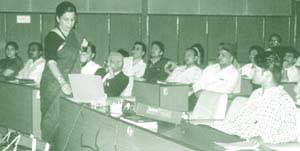 |
CSE staffer in the book release function in Kathmandu, Nepal |
The water crisis in India and the world over needs no introduction. To sensitise people about the alarming situation and to generate interest in decentralised method of water mangement Centre for Science and Environment (CSE), a New Delhi based non-governmental organisation released Making Water Everybody’s Business: Practice and Policy of Water Harvesting, its new book on water in various places in India as well as in Nepal and Sri Lanka. The book releases were carried out with the assistance of partner organisations working on the issue of water to not only strike the local chords but to also make the campaign of ‘People’s Management of Water’, a national movement.
| All good books are like having a conversation with the finest people of the past centuries. But reading this book is like having a conversation with the present people in the field who have written about the success of rainwater harvesting |
Besides covering the over 90 papers presented in the international conference on Potential of Water Harvesting: Technologies, Policies and Social Mobilisation held in 1998, the book includes papers on water conservation from India, Nepal, Bangladesh, Pakistan, Sri Lanka, Singapore, Southeast Asia, Germany and Japan. The book captures the innovations made by people in their struggle to meet water demands. Examples of such efforts are diverse as are solutions, stretching from Ladakh in the north to Kerala in the south and covering the desert, Deccan Plateau, Western Ghats, Eastern Ghats and the coastal plains in between. It informs about the traditional tanks in Bundelkhand, neglected and ignored, which still contribute to ‘modern’ water supply systems. It quotes examples from urban areas of the world where groundwater recharge is preffered for meeting water demands and reducing urban flooding, the result of concretisation. Examples include Germany which gives tax benefits to practitioners of rainwater harvesting while Japan offers subsidies. In Singapore, a country with an area less than Delhi and the highest population density in the world, roughly about 50 per cent of the total urban area is used as catchment.
Kathmandu, NepalOn May 15, 2001, the book was released in a public meeting in Kathmandu, Nepal by the vice chancellor of Tribhuvan University, Navin Prakash Jung Shah. The release function, jointly organised by CSE and Nepal Water Conservation Foundation (NWCF), a Kathmandu-based non-governmental organisation was held at the Birendra International Convention Centre. Welcoming the invitees, Ajaya Dixit editor of Water Nepal, a publication published by the NWCF informed about the need of water conservation and gave credit to CSE under the guidance of Anil Agarwal, chairperson of the organisation for demystifying science for the common person. "Water cannot be looked at in isolation and a new kind of knowledge, linking social issues and behaviour is emerging. The challenge lies in bringing this knowledge into current education systems," he said. Madhukar Upadhyay a watershed management expert informed about how rainwater harvesting along the hill slopes of Nepal could prevent land erosion. Traditionally, farmers practicing terrace cultivation had developed channels that would transport the excessive rainwater through their fields into storage ponds. This practice resulted in reduced soil erosion, while at the same time, provided water in times of need. A decline in this practice had led to severe land erosion and springs drying up.
During the presentation, CSE staffer informed about the serious drought in India and how it was possible to drought-proof the country through a massive people’s movement on rainwater harvesting. Examples from various parts of India and the world documented in the book were cited. In his address, Shah said," All good books are like having a conversation with the finest people of the past centuries. But reading this book is like having a conversation with the present people who he worked in the field and who have written about the success of rainwater harvesting."
Raipur, Madhya PradeshThe next in the series was Raipur, where Ramchandra Singh Deo, Chattisgarh state finance minister released the book. The book was released in a programme titled Sabki Chinta Pani or water is everyone’s concern. The release was organised by Centre for Science and Environment, New Delhi; Mayaram Surjan Foundation, Raipur and the Raipur Rotary Club. The release function was attended by the Raipur Collector, deputy mayor, a sadhu from the oldest temple, Chandrakant Sahu, ex-member of Parliament; Chattisgarh Pollution Control Board; Indian National Trust for Art and Cultural Heritage (INTACH), Marothia and representatives from Indira Gandhi Krishi Vishwa Vidyalaya. In his opening speech Lalit Surjan of Mayaram Surjan Foundation while speaking about the activities of CSE, said "The centre has been involved in raising awareness about environment issues and is responsible for bringing them to the forefront. "Explaining the title of the programme Sabki Chinta Pani, he said, "Water is indeed now a serious issue and should be the concern of every individual in Chattisgarh and the country.
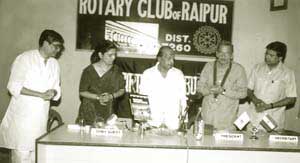 |
Ramchandra Deo releasing Making Water Everybody's Business in Raipur |
In the last decade or so, we have so heavily overextracted groundwater that even if we undertake rainwater harvesting on a large scale, we will not be able to replenish all that we have withdrawn |
Three events marked the release of Making Water Everybody’s Business: Practice and Policy of Water Harvesting in Indore, jointly organised by the Centre for Science and Environment and Nai Duniya, an Indore-based newspaper-publishing house. The book was released by Digvijay Singh, chief minister, Madhya Pradesh on June 5 which apart from being the World’s Environment Day was also the foundation day of Nai Duniya. The function was well attended by people comprising of industrialists, academicians, water experts, district administration, journalists and interested citizens of Indore.
During his speech, Abhay Chajjlani, the proprietor of Nai Duniya shared the initiatives undertaken by Nai Duniya in the field of water. Informing the gathering about their activities, he said that not only they have been constantly writing about the potential and relevance of water harvesting , but have also organised public meetings for generating consciousness amongst the people. During this function, they released their monsoon card, a booklet on water harvesting in hindi and an electronic display board demonstrating how water harvesting could be done in rural houses. The chief minister distributed the display boards to the sarpanchs, who were especially called for the meeting.
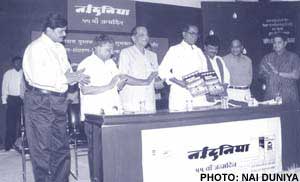 |
Digvijay Singh releasing CSE's new water book in Indore |
Speaking about the book, Abhay Chajjlani, said Making Water Everybody’s Business, gives us the opportunity to know how people led water management efforts have been effective in securing local livelihood security. While speaking on the occasion CSE staffer stressed the need for community-based efforts to withstand the drought menace. The importance for having one ‘jal yodha’ at village, tehsil and district level was also emphasised by the staffer to motivate people to take the onus on themselves to fight the water crisis.
Colombo, Sri Lanka
Making Water Everybody’s Business: Practice
and Policy of Water Harvesting was released in Colombo by the minister for irrigation
and water resources management, Sarath Amunugama on June 12, 2001. After the book release
function a panel discussion was organised in which seven water experts participated. The
release function was jointly organised by the Centre for Science and Environment and
Intermediate Technology Group (ITDG), South Asia, a Colombo based non-governmental
organisation. ‘Traditional Wisdom of Rainwater Harvesting, an Overview from South
Asia, a publication from ITDG South Asia was also released on the same day. While
releasing the book, the minister, Sarath Amunugama was highly critical of traditional
systems of water harvesting. According to him the productivity of crops in Sri Lanka goes
on to prove that there ample water in the area. He was proud of the fact that 80 per cent
of the agriculture is irrigated and the remaining is rainfed. He mentioned the traditional
systems of cascading tanks in the country. Ironically, the minister summed up his speech
by categorising the traditional system as undemocratic, autocratic and partial.The
audience was disturbed by the views of the minister and few of them later voiced their
apprehension.
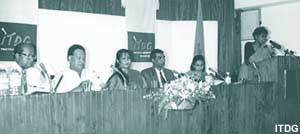 |
Sarath Amunugama released the water book in Colombo, Sri Lanka |
Speaking on the occasion, Lahiru Perera, Regional Director, ITDG South Asia highlighted small water harvesting as a strategy for drought proofing the affected areas, congratulated the editors of the book for such an enriching document.
Ranchi, Jharkhand
In Ranchi the book was released by the governor of
Jharkhand, Prabhat Singh on June 12. The partner organisation was Prabhat Khabar, a
hindi daily. The meeting was attended by about 100 people interested and involved in water
issues. Panelists included Harivansh of Prabhat Khabar, the governor, a geologist
and the speaker of the assembly, Inder Singh Namdhari. Introducing the event, Harivansh
informed about CSE as an organisation and the role it has been playing in raising
awareness. Harivansh was also keen that CSE organise a urban water harvesting workshop in
Ranchi, given the problems of groundwater depletion and the increasing water crisis. A
presentation was then made on the book by CSE. The speaker spoke about the need of
starting a water conservation movement as suggested by CSE. Quoted Amitabh Bachchan from
Kaun Banega Crorepati, he said," Is kaam ka samai shuru hota hai — ab." His
speech was peppered with Kabir couplets. The governor, a former cabinet secretary said
that given the water problems in Jharkhand, where there is more than 1,200 mm of rain and
yet water problems starts February onwards, there is a definite need of rainwater
conservation. He recalled that he had been present when Anil Agarwal, chairperson CSE had
made a presentation before the governors in Rashtrapati Bhawan and suggested that
Jharkhand should take help of CSE to solve its water
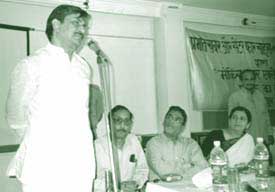 |
Prabhat Singh informing about rainwater harvesting in Raj Bhawan |
problems. He identified two immediate areas of action: one to prepare a base line of water resources in Jharkhand and two, to hold a workshop for government and NGOs on water conservation at the farm level.
The responses from the book release function clearly show that slowly yet gradually more and more people are realising the gravity of the water situation and are willing to join hands to mitigate the crisis. And this is what really the book is all about: Making water everybody’s business.W